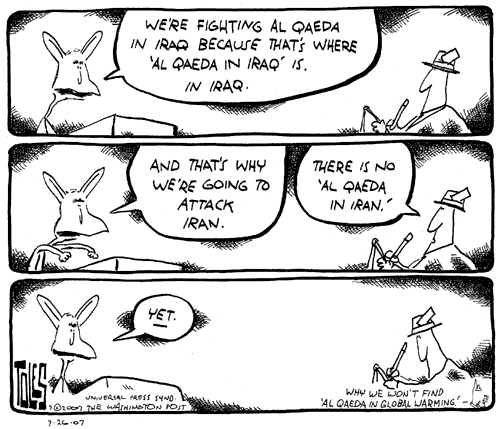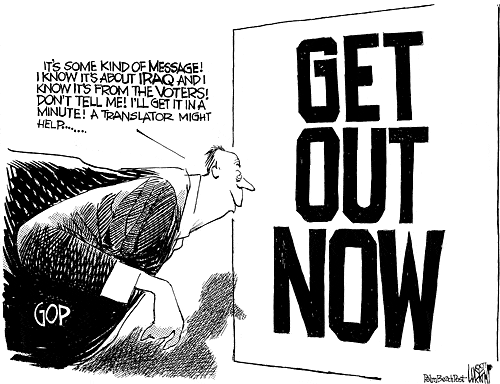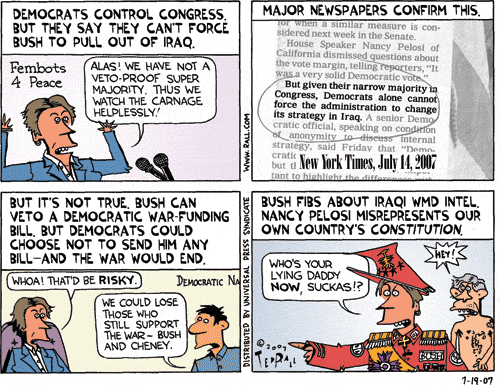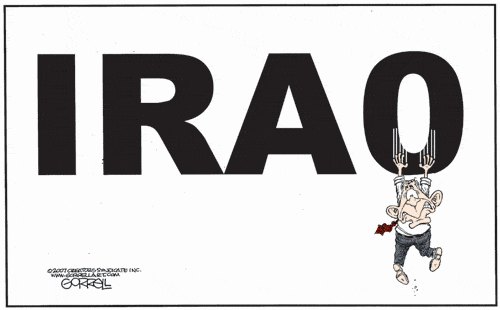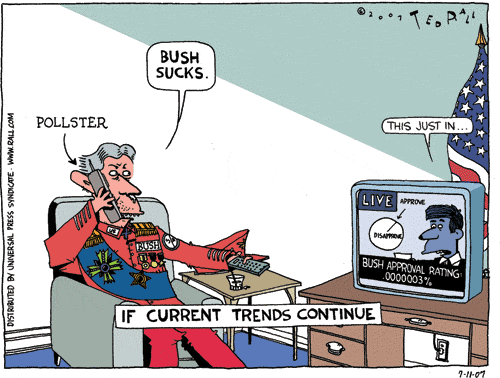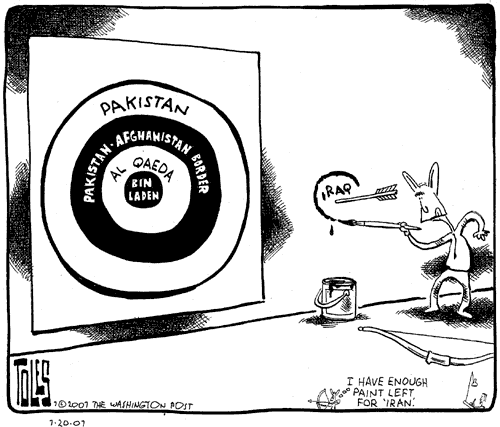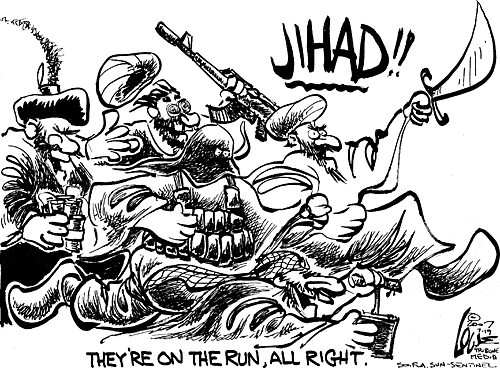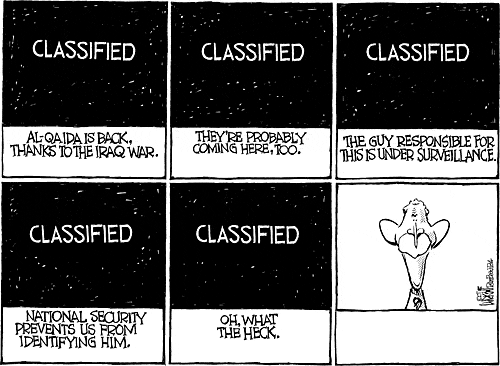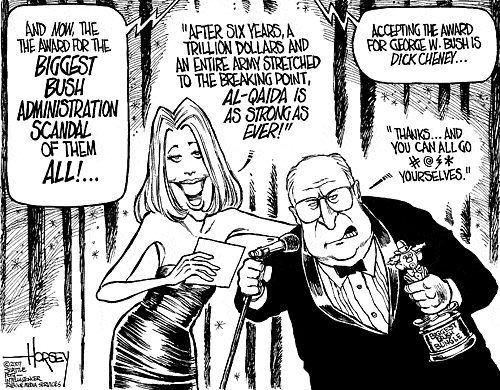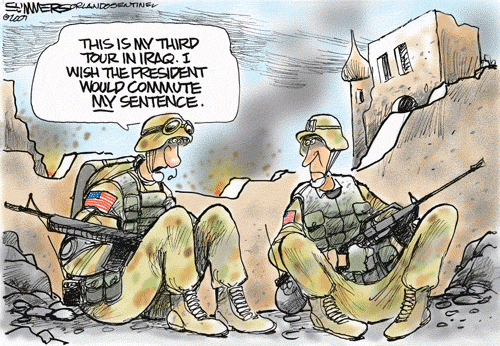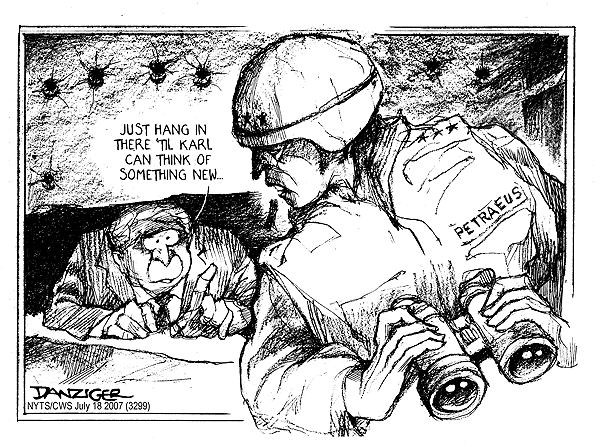INTERVIEW An interview with Tariq Ali
back
By David Barsamian
Tariq Ali, an internationally renowned writer, was born in Lahore in 1943. It was then a part of British-ruled India, now in Pakistan. For many years he has been based in London where he is an editor of the New Left Review. He's written more than a dozen books on history and politics. In his spare time he is a filmmaker, playwright, and novelist. He is the author of The Clash of Fundamentalisms, Bush in Babylon, and Speaking of Empire & Resistance, with David Barsamian. His latest book is Pirates of the Caribbean: The Axis of Hope.
BARSAMIAN: What's your assessment of the opposition inside Afghanistan to the occupation forces? The Taliban is now an umbrella for many different groups.
ALI: I see nothing positive emerging there. I think one has to be very hard-headed and realistic about this, that there are no secular democratic forces in Afghanistan. You basically have rival ethnic groupings. Afghanistan always was a tribal confederation governed by a king on behalf of all the tribes. It has more or less remained that, except there is no king at the head of it as such. The thing is, there will have to be power sharing. Either that or little bits of Afghanistan will be clipped off, like Herat in western Afghanistan.
I feel that NATO has created a situation in which all these groups are becoming popular again as the only groups resisting. And if the secular democratic forces, tiny though they are, in Afghanistan have been backing NATO, it's been a foolish choice on their part. They could have remained aloof from this and held an independent position, but they didn't. Even many former Communists backed the American and NATO occupation of Afghanistan, and they now have no credibility in that country at all.
William Butler Yeats's poem "The Second Coming" has gotten some attention in recent years, "The center cannot hold," etc. However, in "Meditations in Times of Civil War" he wrote: "We had fed the heart on fantasies. The heart's grown brutal from the fare."
That could be a description for all empires as they begin their period of decline. I think the U.S. empire has begun its period of decline. As to when it will collapse is an open question, but certainly that has begun. One can see it in the disasters that they face in Iraq, in Afghanistan. You would have thought, and they thought, that American military and economic power had reached such a stage that they could get away with anything. But it's not as easy as that. And their economic rivals—the Chinese, the Japanese, the Koreans, this is the strongest sector, the Far Eastern sector—watch the American empire stumbling from one disaster into the other and wonder what's going on with the imperial leadership.
I notice the journalists in the United States, Sy Hersh and others, are saying this is the most brutal and stupid government we've ever seen. I can understand their anger, but historically it's not true. You have had governments in the United States which have been even more brutal. After all, the decision to nuke Japan was not taken by the Republican Party. It was Truman's decision which led to the loss of hundreds of thousands of lives. I think it's foolish to say that this particular Administration is that much out of kilter. You go back to the 1840s, when James Polk decided as president to invade Mexico. He invaded Mexico because they refused to sell him California. And his equivalent to the weapons of mass destruction was, "We've invaded Mexico because they've invaded us," which everyone knew was completely false. But he won and got away with it because that was the tide of the rising empire.
Many people said after the Vietnam War, "This is it." But after the Vietnam War, China became a central ally of the United States, the Soviet Union dissolved, and Vietnam today is a thriving capitalist economy. Hardly a serious defeat for the empire. So I'm careful about what I say. But I do think that the failure in Iraq and Afghanistan point to certain weaknesses in this particular empire.
On Iraq, Robert Fisk says the United States is in a real quandary there because it has to leave and it can't leave.
There is no such thing as can't leave. I think it can leave and probably will have to leave, but it will have to decide what it is going to leave behind. This is the big debate going on. Some critics of Bush from the Democratic side, like Peter Galbraith, argue that Iraq should be divided. That, in my opinion, would be disastrous because what you would then create is a series of protectorates, with northern Iraq, the Kurdish area, becoming an Israeli-American protectorate; the triangle, not just Sunnis, because lots of Shi'as live there too, but dominantly Sunni, becoming a Saudi protectorate; and the rest of Iraq being a Shi'ite republic closely allied to Iran.
Whether this Administration will even go that far or whether this will be implemented by a new Democratic president remains to be seen. But I think that is the solution they will favor to try and save face at home, because simply to withdraw would be a political disaster.
The scale of the disaster for Iraqis is mind-boggling. Hundreds of thousands have been killed, many more maimed and wounded, two-fifths of the Iraqi professional class has fled the country, the external refugees number something like two million, mostly in Jordan and Syria. The internal refugee crisis may even exceed Darfur. The educational system has collapsed—two out of three children don't go to school, there is very little security. Nevertheless, with this chaotic landscape, the Iraqi government somehow has cobbled together a hydrocarbon law that will allocate the oil resources of the country.
They've done that because oil is the most important resource the country has, and how it is divided is the central issue. Who has control of oil-rich Kirkuk in the north for instance. The Kurds have been attempting to ethnically cleanse the city of Turkomans and Arabs, and others. I don't think that is necessarily going to work without the backing of the United States, but that is certainly what they're playing at.
The key thing is that the situation in Iraq is a total humanitarian disaster. The refugee crisis is worse than any we've seen in recent years. It is a wrecked country. And it has been wrecked by the occupation, which is why in every opinion poll which asks people, a majority reply, "We were better off under Saddam Hussein."
The Western occupation has wrecked it so much that people are now looking nostalgically towards the previous era. Which is hardly surprising because after the first Gulf War, when the electricity system, the water supplies were cut off, it took Saddam Hussein's regime two months to have everything working again. Then they imposed sanctions to try and destroy it. But basically there was no mass starvation, there was no big exodus. They got the country functioning again. These people have not been able to do that. And this, I think, is a damning indictment of this occupation.
Zalmay Khalilzad, of Afghan origin, was ambassador to Kabul, then to Baghdad, and now has been appointed by Bush to be the representative to the United Nations. He said in invading Iraq,"We have opened Pandora's box."
He obviously knows this is the case because he's been there and can see it with his own eyes. But does he draw any conclusions from that? That's the important question. This is a guy who wrote a pamphlet when he was an adviser to Bush Sr. in which he first posed the question that, given that the world is now uniform and capitalism is primary everywhere, is it possible to assert U.S. hegemony without the use of force. Or will we have to fight against other capitalist countries to make sure we remain on top? And he said we have to use force. So he is one of the people responsible for this new security strategy. But the fact that he sees it as a disaster is very revealing.
If you have someone who is armed and has committed aggression, you would expect that pattern would continue. I'm talking now about the United States in Afghanistan and Iraq. However, when it comes to Iran, you believe that the United States, even though it has deployed massive military forces to the Persian Gulf region, is not going to attack Iran.
This is my opinion based on certain irrefutable facts. There are two ways they could do it. There could be a surgical military strike on 150 different nuclear sites that exist in different parts of Iran. They're not all in one place, so it would be a heavy bombing campaign, which would affect the whole country. That is the only thing that is militarily possible. It is not possible to invade Iran because the United States doesn't have enough forces to do so. They don't have enough troops to run Iraq, leave it alone and take over another country. So militarily, a land invasion is totally excluded.
Second point. What would be the effect of an air strike against the Iranian regime? The immediate effect would be the opening up of two new fronts. The Iranians would then say, "Okay, the gloves are off and they would tell their supporters in Iraq, "Fine, take them on." They would probably say the same to their supporters in Afghanistan. And possibly, though Hezbollah in Lebanon is not totally under their thumb, they would say, "Open a new front there." So you have the likelihood that any attack on Iran would completely destabilize large sections of that part of the world.
If I were a Pentagon general running the war in Iraq, determined to preserve as many of my troops as I can, and a politician came and said, "Hey guys, we're going to take out the nuclear reactors in Iran," I would say, "Just a sec, Mr. President, or Mr. Vice President, or Secretary of State," or whoever. "Have you any idea of the costs we could incur on the battlefield if this happens? We're not prepared to do that." I think you will probably have a rebellion behind the scenes if this decision is taken.
Also the bulk of the Europeans are against it. The Germans are against it, the French are against it, and even the British are not for it, to put it mildly. So you would have an even bigger split than you had on the Iraq War. At the same time, the Russians are selling the latest, most advanced anti-aircraft technology to the Iranians quite openly. They've been attacked for that. Because the last thing the old Soviet Union did was to develop very high quality anti-aircraft weaponry, which they were about to give to the Serbs, the Yugoslavs, but didn't because they wanted a settlement. But they're selling it openly to the Iranians. So the Russians will certainly not be in favor of it. The Chinese have signed a 30-year deal with Iran to supply fuel and energy. They're not going to be in favor of it. So it's the one action the United States could take if it wanted to totally isolate itself and create disasters for itself.
I think one of the aims of this rocket rattling, which we've seen, is regime change in Iran without any invasion of the sort, to say, "Ahmadinejad is a figure who could bring your country close to destruction. Get rid of him."
Explain the Sunni/Shi'a divide. What is the main issue?
The Sunni/Shi'a divide is a division for the heritage of the Prophet Mohammed. It's a political dispute over the succession. The people who are now Shi'as say that the caliph who replaced Mohammed should have been Ali, his son-in-law, married to Mohammed's daughter, Fatima. The others argue that the Prophet had always said that the successor should be chosen by the umma, the community as a whole. The community as a whole did meet and they didn't vote for Ali, they voted for Omar, who succeeded him and who was a very gifted political and military leader. Probably the right decision was made. Then these internal, internecine rivalries produced divisions and Mohammed's grandsons, Ali's sons, were then encouraged to rebel against the legal caliph. He did what most rulers do, which is to wipe out the rebellion. That became the big thing—that the Prophet's grandson, Hussein, had been killed. The other wasn't killed at all. He lived and died a normal death. He lived in Medina—he was not even punished—and accepted the caliphate. But these people then carried on a fight. So it was essentially a struggle for power.
Once you have this division early on in a faith, it is reproduced and reproduced and reproduced. Of course, they have their different customs, different interpretations of Islam. Some of them are so esoteric that it's best not to discuss them on a family show. But these have been carried on. Often, until Khomeini's revolution, the differences were greatly exaggerated. Then the victory of the Iranian revolution brought this up again. But one should remember that Khomeini's victory was welcomed by Muslims everywhere, Sunni and Shi'a. But the use of this particular faction of Islam has meant that the Saudi monarchs and the Gulf States are very nervous, because in Bahrain 80 percent of the population are Shi'a. In Saudi Arabia, in the areas where the oil is, they are dominated by the Shi'a.
In Pakistan there has been a history of anti-Shi'a violence. Processions are attacked, mosques are burned.
This is a very recent history. This is something which began in the late 1980s and 1990s. It never existed in the past. The Shi'as were part of the Muslim community. Shi'as rose to quite high positions in the army and the civil service. There were no big problems. This is the development of Salafism and Wahhabism and religious extremism in Pakistan, which is so sectarian that it regards Shi'as as non-Muslims, saying, "How can they be Muslims. They believe in these imams. Islam doesn't. Islam believes in Allah and the Prophet. That's all, nothing else between them." Which technically, of course, whether we like it or not, is accurate, if you study the theology. So they say that Shi'as are not Muslims, they are apostates and should be wiped out.
There has been a persistence of so-called theories about September 11, 2001. The Guardian recently reported that "more than a third of Americans believe that either the official version of events never happened or that U.S. officials knew the attacks were imminent, but did nothing to stop them." Do you run into these ideas in your talks ?
I encounter this, but largely in the United States, I have to say. I am giving a talk and at the end there's question time. And a plaintive voice says, "Tariq, do you believe we did it ourselves?" I've argued in my book Clash of Fundamentalisms, and I carry on arguing, that, no, this was not an action carried out by the United States; that it's a sign of total alienation from reality to believe that the United States carried out the attacks on the Twin Towers and the Pentagon. Then the conspiracists say, "But the Pentagon wasn't really hit," and numerous other theories which they have developed, which I find sort of psychologically interesting but politically worthless.
Psychologically they're interesting as to why do people fall in love with these theories? In the United States there is a deep mistrust of government, for good reason, because this government—not just this government, but historically many governments—have lied in order to get their way. But I don't think any government in the United States has actually carried out actions of this sort against its own country. It would be crazy of them to do so because the one thing about the United States is that it's difficult to keep things totally secret. If this had happened, it would come out sooner or later. And if it actually happened, it would discredit the entire structure of the American system and of politics in this country.
I certainly don't accept any of these conspiracy theories which say the United States organized these hits. Why the hell should it? It needs excuses to go and make wars? It never needed them before. It's bizarre.
In the Muslim world it's different. One is blind anti-Americanism, not being able to see that the United States hasn't done that. The second is an element of self-denigration, which is that we aren't intelligent enough to have done this. I remember after 9/11, I was approached after talks by quite intelligent people. Middle-class doctors and teachers would stop me on the street after I had given a talk and say, "Do you really think that we were mentally capable of doing it?" And I said, "Well, actually, the fact that this group did it shows that they were mentally not very strong because it's a foolish thing to have done. It hasn't strengthened them or their cause, it has weakened it. They will realize that one day. But," I said, "yes, technically they are perfectly capable of doing it." After all, the guys who trained these people as pilots said they didn't want to know how to take off or land but how to fly a plane in midair. So, I said, "They knew what they were doing. And that certainly any fool can do it. It's not a big thing to do."
And then the other argument comes up. "But can this one guy sitting in his cave in the Afghan mountains"—I said, "It's got nothing to do with that. These are middle-class, trained, skilled people. These are not peasants who carried these acts out; they're educated graduates in the sciences and medicine, in engineering. It's a sort of political act, which they've carried out. They are wrong, but they did carry it out. There is no dispute about that.
"Why aren't you so worked up about what's happening in Iraq? Why don't you constantly maintain a barrage of propaganda on the streets against that war and the killings there instead of spending so much time and energy on these conspiracy theories?" That's a question these people should be asking themselves. Even if they were right, they should be against the war in Iraq.
Do you think there is a racist factor at work here—3,000 Americans were killed on September 11?
Yes, they were Americans. But there were also Indians, Pakistanis, and many others from various countries working in the Twin Towers. But, of course, in the empire, when an American dies, it means much more than anywhere else. I recounted in Clash of Fundamentalisms a story of a taxi driver, his SUV festooned with stars and stripes. When I asked him in October of that year why he was festooned with stars and stripes and what he thought about the whole thing, once he realized that I wasn't an American, he said to me he was pleased it had happened. He was from Central America and so many of their people had been killed by pro-American governments that they know what it feels like. I tried to tell him, "But this is not going to get anywhere." He said, "Yes, I know, but I still feel happy." Latin America is the place where it received the biggest support. The Muslim world was in a state of shock because they knew what was coming.
The issue of the Armenian genocide lingers 90-plus years since it happened in 1915 in Turkey. On January 19, 2007, Hrant Dink, a prominent, independent journalist, was murdered in Istanbul. Turkey's Nobel Prize winner Orhan Pamuk has been threatened because he has spoken about the Armenian genocide. Another writer and academic, Elif Shafak, has also been threatened.
I think there are two or three related factors here. One is that the national state created by Kemal Ataturk—or the people even before him, the Young Turks under whom the genocide was carried out on the Armenians—assumed that the only way a national state would survive and be created in Turkey was by removing all extraneous forces. And the Armenians were a large, old, established community, especially in eastern Turkey. But, of course, that imploded because the fact that Turkey became largely a Muslim state after the expulsion of the Greeks, the genocide of the Armenians, etc., didn't save it from that. The fight of the Kurds for their own autonomy, meant that this problem couldn't go away.
It's now ironic, when you look back on it, that they did this. I said when I was in Eastern Turkey, "Of course, your forefathers wiped out the Armenians, which was a big tragedy, because if the Armenians had still been part of eastern Turkey, how could you have spoken of Kurdistan, because they were a majority? Certainly in Diyarbakir they were—the non-Kurds were a majority. "So you would have been forced to live together and not become narrow nationalists." And, of course, there is no reply to that. There are all sorts of contradictions in how and why that happened. But it was the deadly logic of ultranationalism. That's how it works in most parts of the world when people go down that route.
Why don't they admit it? One, because for a long, long time they were ultradefensive about it. Now I think the events are so far removed that there is a section of the Turkish elite and political class that would probably admit it. I once said to a senior Turkish civil servant, "Why don't you admit it and apologize? You didn't do it." But say, "Those who did it, it was reprehensible, unacceptable, we apologize, we welcome Armenians to come back and see their villages," etc. He was very blunt with me. He said, "We cannot afford to pay money out. If you accept the use of the word 'genocide,' then—thanks to what the Germans in the reparation agreements with the Israelis over the Holocaust—we are lumbered forever. We just don't have the funds to do that. Do not underestimate what I am telling you." So I said, "What if you referred to it as, 'The mass organized killings of Armenians that took place and were carried out by Kurdish irregulars were a tragedy. We apologize for them'"? He said, "If that were the wording, I think you would find many people in Turkey would accept it."
The reason for those killings was to drive out a population. It wasn't in the sense that they are inferior, do you see? It wasn't racial but ethnic. They didn't say the Armenians are inferior to us because they married lots of their women. That was fine. But the killings took place for reasons of nationalism and reasons of property. The Kurds were much poorer. They were among the poorer sections of the community. Many Kurds grew rich from the Armenian estates, lands that they had stolen. The great Turkish writer Yasar Kemal has written in many of his novels about what was done by Kurdish militias to the Armenians. So it's something that is accepted and that needs to be done. But I would argue that the Turks should go and say publicly, "The killings took place." If they don't want to use the word "genocide," they should just make that statement and let's see where it goes.
You're now interested in a topic you're calling the human rights industry. What's that about?
It's the use of human rights. Obviously, we're all in favor of rights for people. All rights are judicial rights. They have to be fought for and won. But an industry has grown up since the end of communism that uses the concept of human rights—humanitarian interventions, military humanism—essentially as the new ideology of the post-Communist world and to cater to the needs of the U.S. empire. This has developed and mushroomed.
If you go to U.S. campuses, there are human rights departments. You never had them before. So you have to ask, why at this particular time in American history have these developed? Why didn't Harvard create a center for human rights in the 19th century when the memory of the Indians that had been wiped out was fresh in American minds? Why now?
I call it the human rights industry after Norman Finkelstein, whose parents were in Auschwitz, who wrote a book called The Holocaust Industry, which is the uses that are made of the Holocaust in order to justify A, B, and C. That, in my opinion, is something which is happening with the human rights industry today, both on an ideological level and in the mushrooming of nongovernmental organizations all over the world.
These are organizations that I have referred to as WGOs—Western governmental organizations—planted in different parts of the world with money from Western foundations and governments, which have bought over a large layer of the intelligentsia in many countries and which remind me of the activities of the Congress for Cultural Freedom during the Cold War, the money the CIA poured into creating magazines, etc. This is something which needs to be discussed, simply to make available an alternative view of this. Because people say, "How can you be opposed to human rights?" We're not opposed to them. We're opposed to the use that is being made of them and the grotesque double standards that are employed in this situation.
Z
David Barsamian is founder and director of Alternative Radio in Boulder, Colorado. He is a radio producer, journalist, author and lecturer. His interviews and articles appear regularly in the Progressive and Z Magazine. His recent books are Imperial Ambitions with Noam Chomsky, Speaking of Empire & Resistance with Tariq Ali, Original Zinn with Howard Zinn, and Targeting Iran.
